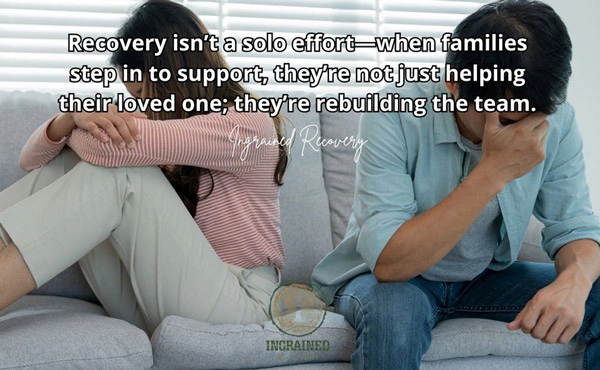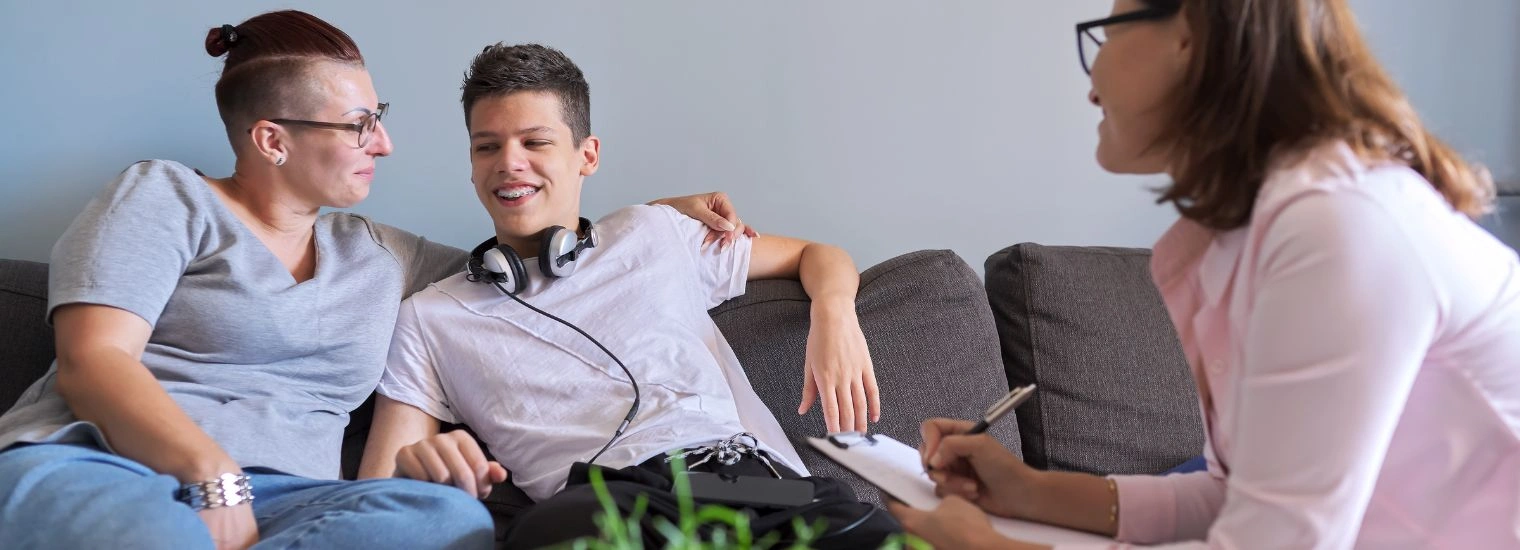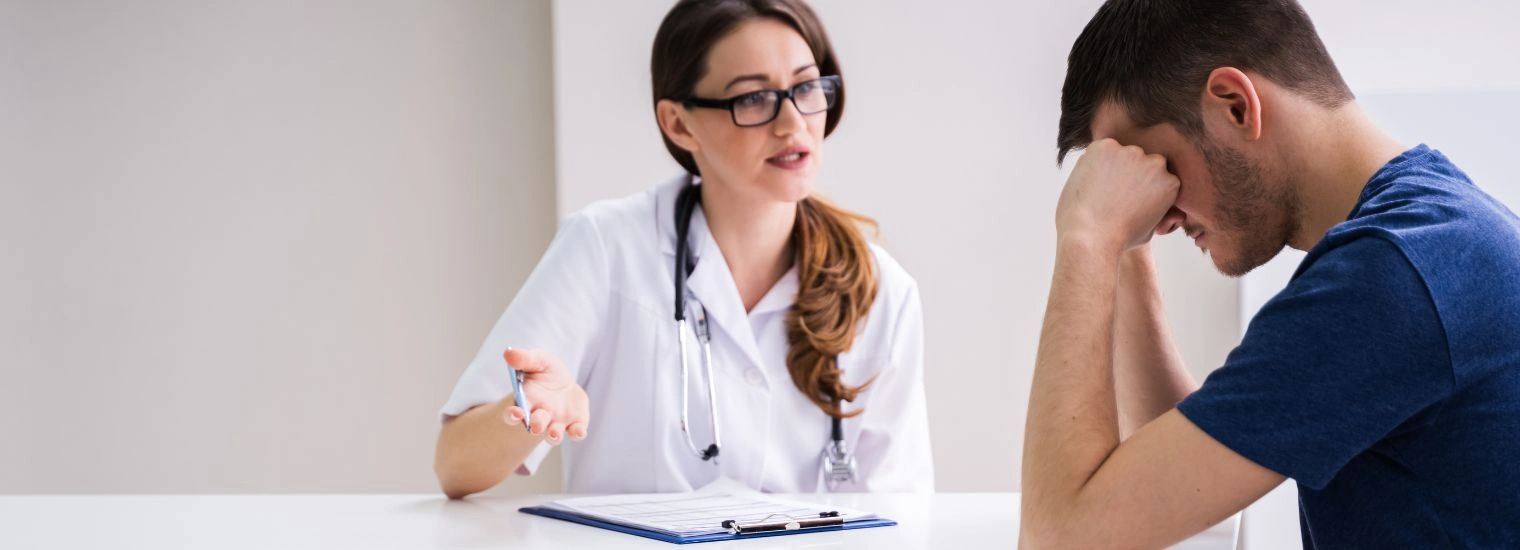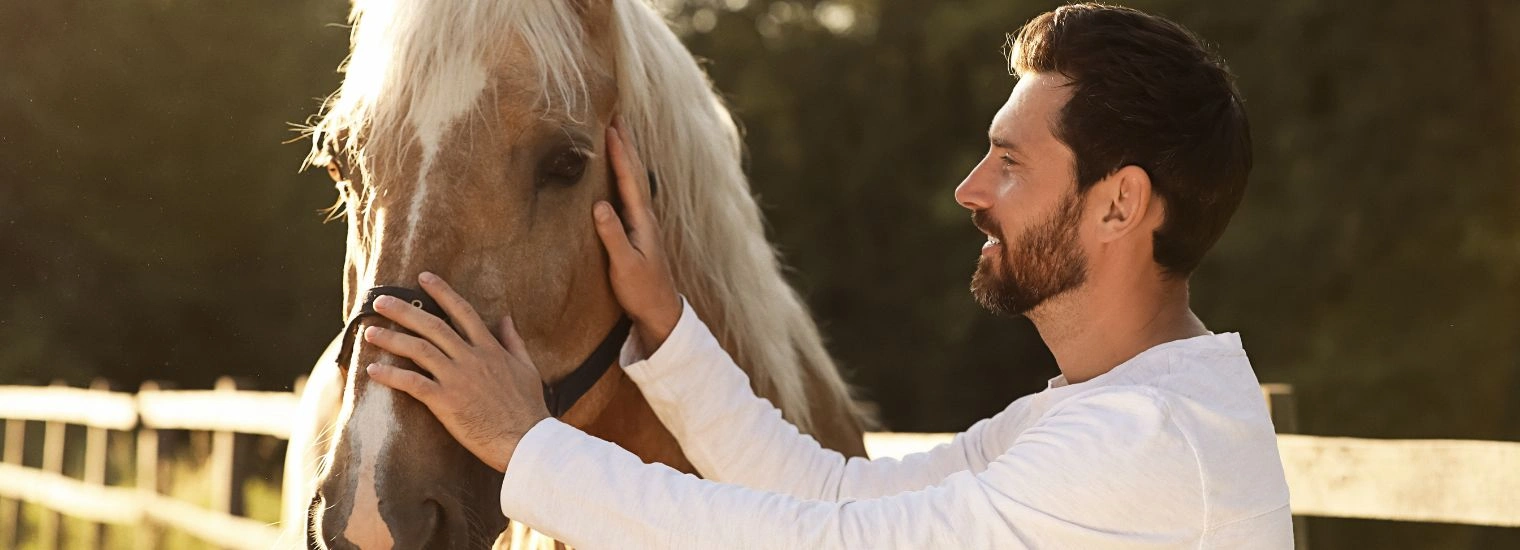Family Involvement and Support at Our Recovery Center in Georgia
Addiction is a chronic disease that harms entire families. For some battling addiction, family programs provide the most effective recovery process. But when you’re seeking a family rehab program, Georgia offers few addiction treatment centers that take this comprehensive approach to mental health treatment (outside of a small handful of north Georgia recovery centers).
Ingrained Recovery is one professional substance abuse treatment that does provide this specialized care for people struggling with addiction and their family members. We recognize that substance use disorders can impact the entire family, and shared healing can be a path forward.
Are you trying to learn how family therapy at our Eastman, Georgia, addiction treatment center can help improve the mental health of your loved ones? We encourage you to read to learn more about the family treatment process.
Get Effective Treatment Programs at Ingrained Recovery

Why Is Family Rehab So Important for Lasting Recovery?
When a loved one struggles with drugs or alcohol, the entire family feels the impact. It’s a little like a football team recovering after a fumble.
Imagine a game where the running back drops the ball – a classic fumble. Chaos erupts as all players try to scoop up the fumbled ball. Fortunately, the running back’s quick-thinking teammate dives on top of the ball and protects it. Recovering the football is what family rehab provides – a structured setting where families rally to help one another.
Once the fumbled ball is safe, the quarterback regroups and calls the next play. Then, the team can move forward together. That’s what happens when families reset, rebuild, and recover together.
Get Proven Detox and Rehab Options at Ingrained

Goals of Family Addiction Treatment Services
Family substance abuse treatment programs have several key goals:
Improve Family Communications
Experienced professionals help families rebuild trust. They also learn how to express their emotions appropriately and without accusations. Families will clear up past misunderstandings and learn how to listen to each other moving forward.
Create More Positive Family Dynamics
The treatment plan uncovers enabling behaviors, codependency, or any other dysfunction that might contribute to drug and alcohol abuse. Once professionals identify these circumstances, they can disarm them and replace these behaviors with healthier ones.
Educate Loved Ones on Mental Health and Substance Abuse
Whether you attend an inpatient treatment program or outpatient services, families learn about mental health issues, addiction, relapse prevention, and the recovery process. Having this understanding shows them how to provide appropriate and necessary support.
Provide Emotional Support for the Family
The person struggling with drug or alcohol abuse is not the only one suffering. Loved ones will receive professional care as they process their own emotions. They may have guilt, shame, anger, or fear to work through with the mental health professional.
Build a Sober, Calm Home Environment
Families learn to maintain a positive, substance-free living space, especially important in early recovery. A family who cannot provide safe, stable housing can turn to the Georgia Association of Recovery Residences (GARR) for resources. Our team will help with referrals throughout this process.
Help Find Community Resources
Our family treatment program guides families in discovering local resources for themselves and the loved one struggling with drug or alcohol abuse. Examples include life skills classes, GED programs, 12-step programs, or even locating basic medical care services to ensure lasting recovery.
We are also able to offer support on planning and staging a successful intervention should your loved one need help in seeing the damage their behaviors are causing and gaining the willingness to seek help.
Our Addiction Treatment Center Offers Customized Care

Each family has a different dynamic. At Ingrained, we customize each family addiction treatment plan to address specific challenges. Families may work in individual counseling or group therapy. They’ll also learn relapse prevention strategies to continue making progress after the formal treatment program ends.
How Family Substance Abuse Treatment Programs Work
Depending on the specific client, family rehabilitation integrates with residential rehab or outpatient treatment programs. One or more people in the family may struggle with drug and alcohol issues.
Here are some key components of family addiction medicine:
Family Therapy Sessions
Licensed medical professionals lead family sessions at our central Georgia addiction treatment center. Those attending therapy will work individually and together to address the following:
- Trauma that led to the addiction or trauma to family members because of addiction
- Harmful or negative behavioral patterns within the family dynamic
- Old wounds or conflicts that have been unresolved
Each of those factors may contribute to the alcohol or drug abuse and must be resolved to restore good relationships.
Psychoeducation and Support Groups
Families continue to grow their knowledge about:
- How addiction happens
- The impact of substance abuse
- Dual diagnosis treatment programs for mental health issues along with addiction
- How to become a stronger support network.
Treatment center professionals will undoubtedly recommend finding supportive family resources like Al-Anon, Nar-Anon, or SMART Recovery Family & Friends meetings. The National Association on Mental Illness also offers weekly support groups in larger metro areas.
Boundary Setting and Codependency Work
Professional addiction treatment centers will also teach program participants how to set boundaries and end codependency. These sessions help the person struggling and their enablers develop healthier relationships by setting firm boundaries.
Who Benefits from Family Rehab?

Here are some typical family dynamics that may benefit from the help of a professional addiction treatment center:
- Parents of a young adult struggling with mental health issues or addiction
- The spouse or partner of a person at a residential treatment center for SUD treatment programs
- Siblings or grandparents ready to take a more active role in helping their loved one
- Children of parents who have been in and out of drug rehabs
These are just a few specific examples of people who could benefit from working with addiction treatment providers to manage their own emotional well-being and restore a functioning family.
Structured Settings of Family Therapy
In some situations, the person attending drug and alcohol rehab may be in a residential facility for the most comprehensive care. But in other cases, the person may be in outpatient counseling, either an intensive outpatient program or a partial hospitalization program. Supporting family members, of course, are receiving outpatient care.
Here are some fictitious examples that illustrate the structure of a family rehab program:
Sofia Attended a Residential Treatment Program
Sofia, 20, entered residential rehab after her heroin addiction caused a steep decline in her mental health. Sofia’s mother, Marta, took the addiction personally and made it all about herself, leading to additional conflict. Marta attended counseling with Sofia at the inpatient treatment center several times a week to work on their relationship and to resolve her own internal conflicts. Most importantly, Marta learned how to support Sofia after the residential program ended.
Kenny Sought Outpatient Care after a Failed Drug Test
Kenny, 34, failed a random drug test at work. His manager gave Kenny a second chance if he used his company health insurance to get help. Kenny attended an intensive outpatient treatment program several evenings a week after his shift.
He found dialectical behavior therapy especially helpful. Kenny’s husband, Christopher, attended family sessions regularly. Christopher learned to provide the appropriate level of support to Kenny without continuing to enable his abuse of prescription drugs.
Jana Sought Inpatient Care for Alcohol Use Disorder
Jana, 29, had an AUD that had damaged her liver. She chose a medically supervised detox followed by residential rehab to ensure her physical well-being. As she got stronger, her residential program included family therapy. Jana’s sister, Rose, and her parents had been distraught by Jana’s declining health but had still become her biggest enablers.
Together, they learned how to help Jana continue to regain her physical, emotional, and mental health. They made a difficult choice, deciding to explore recovery residences after residential rehab. They realized they might still enable her drinking.
Other Integrated Recovery Center Services

Family rehab works alongside all other recovery center services. Here are some evidence-based therapies you may experience:
Medical Detox
When you’re ready to stop using drugs or drinking alcohol, a medically supervised detox helps keep you away from harm. Abruptly stopping the use of substances causes disruptions in the brain’s chemistry, causing withdrawal symptoms to develop. Those symptoms are practically impossible to predict – some have mild to moderate withdrawal while others have seizures or psychotic episodes.
Having a medical team to track your symptoms and offer medications to keep them in check keeps you as safe – and as comfortable – as possible during the first days at our Georgia addiction treatment center.
Dual Diagnosis Treatment
Treatment professionals refer to the presence of an SUD with another mental health diagnosis as a dual diagnosis. You might also hear this called co-occurring disorders.
When this co-occurrence happens, treatment centers must address both diagnoses simultaneously. By doing so, they can help break the addiction while also helping the client learn to manage any underlying mental health issues.
Medication-assisted Treatment
MAT is an evidence-based therapy where a treatment center professional prescribes a less addictive, FDA-approved medication to replace the illicit drug or alcohol. This method is frequently used to treat opioid use disorder and alcohol use disorder.
Individual Counseling and Therapies
Our clients work with licensed counselors and therapies to receive science-backed treatments, including:
- Cognitive Behavioral Therapy
- Dialectical Behavioral Therapy
- Trauma-informed Therapy
Your treatment program will be according to your own needs. You may also experience peer group therapy, which helps learn problem-solving and other essential life skills.
Equine Therapy as a Component of Our Family Rehab Program Georgia Offering

Our Georgia addiction treatment center is not your usual clinic. We’re set on 50 beautiful acres and offer equine-assisted therapy. Working with horses helps our clients resolve communication, trust, and emotional disconnection issues. Horses are intuitive creatures that provide tremendous support in recovery.
Our Eastman, Georgia Addiction Treatment Center and Using Your Insurance
We accept both self-pay clients and private or group health insurance plans. Our commitment to helping you recover starts when you call our admission center.
We’ll inquire about your insurance plan and take the necessary steps to ensure that your costs are covered to the maximum extent possible. We strive for $0 of out-of-pocket costs for you to bear.
Up To 100% of Rehab Costs Covered By Insurance
Contact Ingrained Recovery for Effective Family Rehab Support
Call Ingrained if you are ready to embark on a new, fulfilling life with your family and loved ones by your side. We can help you end addiction and restore family bonds in a way you probably never thought possible.
Our admissions team can guide you as you take that next step – contact us today.
